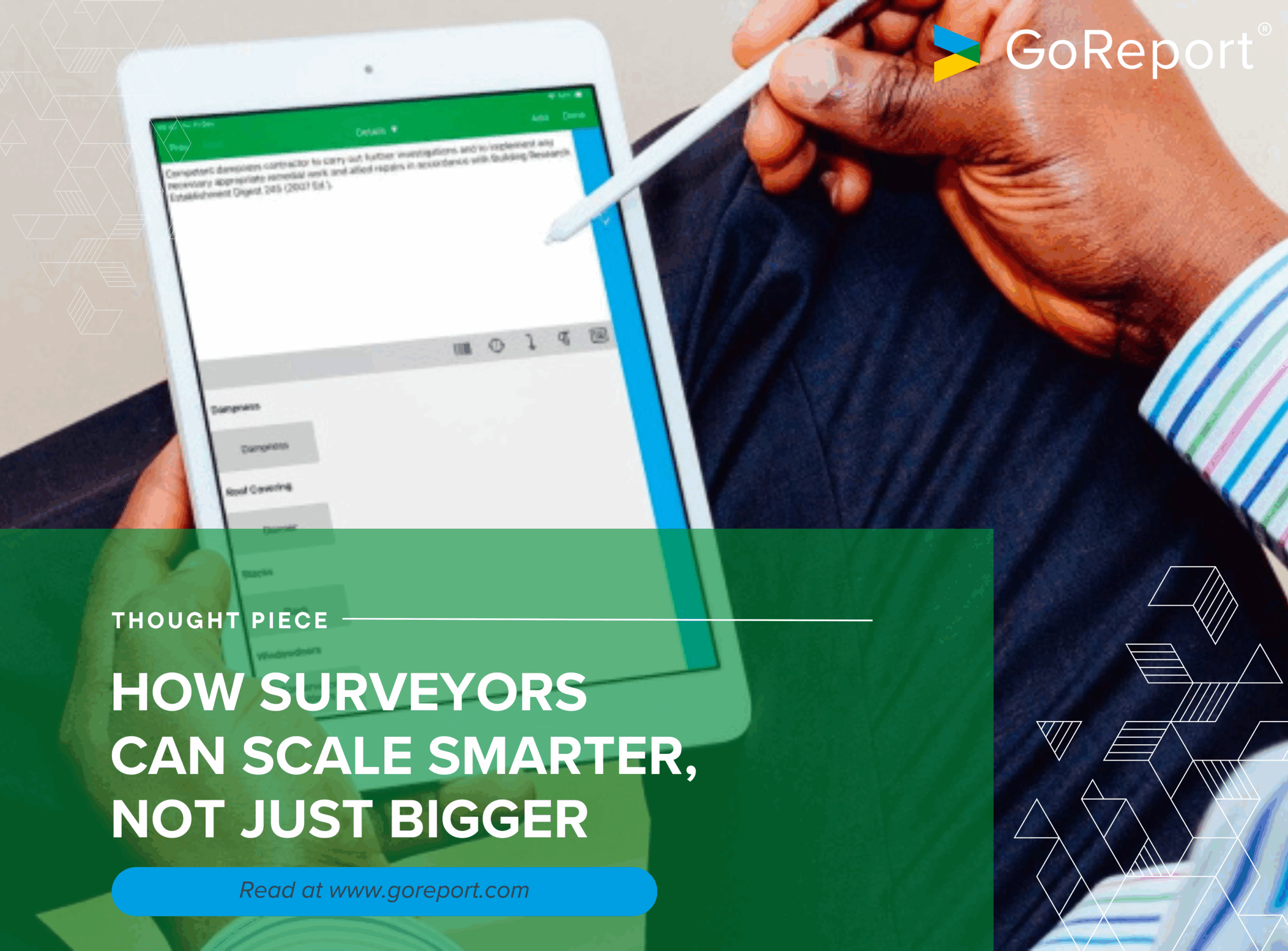The Future of the Surveying Profession: Skills for 2026 and Beyond

If you’re a practising surveyor, you’ve probably noticed it already. The shift. The tightening legislation. The growing client expectations. The steady integration of digital tools that are transforming how information is gathered, shared, and understood.
Technology has become an expectation for many clients and the foundation of modern surveying. From data capture to client delivery, digital workflows are improving accuracy, saving time, and allowing surveyors to see and interpret buildings in ways that weren’t possible before. However, this transformation also brings new expectations. The future of the surveying profession will reward those who not only use technology but truly understand how to translate digital data into meaningful, actionable insight.
Surveying has always been a discipline grounded in precision. As the landscape changes, precision alone is no longer enough. The modern surveyor must think strategically, operate digitally, and communicate effectively – skills that together define the professional identity of 2026 and beyond.
What’s driving the transformation in surveying
Three major forces are shaping the profession’s direction: legislation, sustainability, and digital transformation.
Legislation and accountability
The Building Safety Act 2022 has redrawn the boundaries of professional responsibility. Surveyors are now accountable for the accuracy, traceability, and transparency of their data over the lifetime of a building. This isn’t just about compliance. It’s about creating a culture of accountability that follows an asset from design through to operation.
Sustainability and lifecycle thinking
Surveyors are increasingly expected to assess not only what exists, but how it performs over time. Net Zero targets, retrofit programmes, and embodied-carbon assessments mean that every inspection has a wider environmental implication. The profession is moving from assessing defects to forecasting resilience.
Digital acceleration
Advances in technology are enabling faster, safer, and more comprehensive surveying. Drones, LiDAR scanning, and mobile reporting platforms are helping professionals gather and process information more efficiently than ever. But collecting data is only the starting point. The real value lies in how that data is interpreted, connected, and communicated.
These forces together are redefining what success looks like for surveyors. The question is no longer, “How thorough is your report?” but rather, “How effectively can you communicate what it means?”
The skills that will define the surveyor of the future
1. Digital fluency and data storytelling
By 2026, digital literacy will be the baseline rather than a differentiator. Surveyors don’t need to be software engineers, but they must be comfortable working within digital ecosystems, from BIM models to cloud platforms. The profession’s value will increasingly lie in interpretation rather than just collection.
The data itself is only the starting point. The ability to distil findings into a compelling narrative that connects technical insight with business impact will set leading professionals apart.
Surveyors who can turn a 3D model into a conversation, or a dataset into a decision, will hold a clear advantage. Digital tools make that possible, but human expertise is what gives the data context.
2. Regulatory depth and lifecycle awareness
The Building Safety Act has created a new professional ecosystem where evidence, documentation, and accountability are intertwined. Surveyors must now think beyond the inspection stage and consider the long-term implications of their reports.
Understanding how buildings age, perform, and adapt is becoming as important as identifying immediate defects. This means developing skills in materials performance, retrofit feasibility, and environmental impact assessment.
Those who can anticipate future risks – structural, financial, or environmental – will move from being technical consultants to strategic advisors. The future of the surveying profession will belong to those who see the whole lifecycle, not just the current state.
3. Client communication and commercial intelligence
Technical accuracy remains the foundation of surveying, but communication is now what gives it value. In an age where digital data flows quickly and clients expect clarity, the ability to simplify without losing substance has become an essential professional skill.
Clients no longer want dense, jargon-filled documents. They want concise summaries that explain the risk, the implications, and the next steps. Surveyors must therefore become translators, balancing technical depth with accessibility.
Commercial understanding also matters more than ever. Surveyors who can connect findings to cost, compliance, and long-term value will naturally stand out. Technology helps, but human interpretation builds trust.
4. Agility and lifelong learning
As both regulation and technology evolve, so must the profession. The next generation of surveyors will need agility: the ability to adapt quickly, learn continuously, and apply new tools intelligently.
This doesn’t mean constant upheaval; it means curiosity and confidence in experimenting with better ways of working. Digital transformation opens the door for more accurate surveys, faster turnaround times, and stronger collaboration between teams.
Experienced surveyors have a critical role in guiding this shift. Mentoring younger professionals, sharing on-site wisdom, and embracing reciprocal learning will help bridge the gap between traditional experience and new capability.
From technician to strategist
Perhaps the most significant transformation ahead is not technological but philosophical. The surveyor’s identity is shifting from technical expert to strategic advisor.
Clients no longer just want findings; they want foresight. They want a partner who can interpret risk, anticipate change, and connect data to action. The next generation of surveyors will operate less like inspectors and more like strategists, using technology as a catalyst for deeper, more informed decision-making.
That evolution will require confidence, communication, and curiosity in equal measure. It will also reward those who understand the bigger picture: that surveying is not just about buildings but about people, safety, and the stories data can tell.
Preparing for the profession of tomorrow
If you want to future-proof your career, start by conducting a personal skills audit. Assess yourself across four categories: technical knowledge, digital capability, communication, and commercial understanding. Identify your weakest area and focus there first.
Try introducing small, practical improvements. Use a data-capture platform that streamlines your workflow. Create a dashboard to visualise recurring defects. Ask for feedback on how your reports are used by clients and project teams.
Incremental progress compounds quickly. What matters most is that you’re moving forward — because the profession certainly is.
Embracing a digital future
Surveyors who embrace digital tools as partners rather than replacements will not only stay relevant but redefine the standard of excellence.
At GoReport, we see this transformation every day. Our digital data-capture platform helps surveyors move beyond manual reporting and spend more time interpreting insights that matter. It’s about freeing skilled professionals from admin to focus on what they do best: delivering value, building trust, and helping clients make informed decisions.
If you’d like to see how our software supports that ambition, you can book a free GoReport demo and explore how digital reporting can elevate your practice. The future isn’t something to fear, but something to shape. The surveyors who embrace it now will be the ones defining what the profession looks like next.
FAQ
What will be the most important skill for surveyors by 2026?
The ability to interpret and communicate digital data effectively. As tools automate measurement, human value will shift toward context, storytelling, and decision support.
How will the Building Safety Act affect surveyors?
It extends accountability across a building’s lifecycle, requiring surveyors to maintain clear digital records, demonstrate competence, and provide traceable information for long-term compliance.
Is technology replacing surveyors?
Not at all. Technology handles repetitive processes but relies on human expertise for interpretation and assurance. Digital tools enhance, not replace, professional judgement.
How can surveyors stay competitive?
Invest in digital skills, strengthen communication, and stay informed about regulatory and sustainability trends. Continuous learning is the key to long-term relevance.
Which digital tools should surveyors learn?
Focus on BIM integration, drone and imaging software, and digital reporting platforms that support data handover and client collaboration. The goal is fluency, not complexity.







